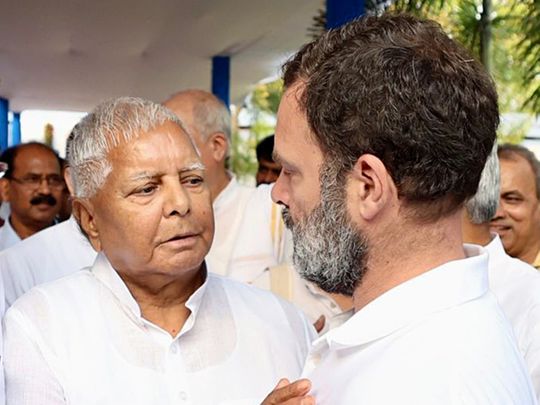
Like a good Indian uncle at a wedding, 75 year old Lalu Yadav advised 53 year old Rahul Gandhi on stage in Patna to get married. It’s never too late, he said.
Indian politics is full of unmarried or at least single leaders, often widowed and separated ones as well. These include Narendera Modi, Naveen Patnaik, Mayawati, Mamata Banerjee — just a few that come to mind. Why, then, do people obsess only over Rahul Gandhi’s relationship status?
Lalu Yadav publicly asking Rahul Gandhi on stage to get married (at 53) is to be read as a political message. It was, again in the manner of an Indian uncle, a way of asking Rahul Gandhi to ‘settle down’.
Bachelor politicians are married to politics. Rahul Gandhi still lives quite the bachelor life. He’s not his party president, or anything. He holds no office in the Congress party and is not even a member of parliament. Given his legal troubles we don’t even know if he will be able to contest the next Lok Sabha election.
Yet there he was, on stage, first from the left, attending the opposition unity meet in Patna, along with his party’s president. In what capacity, nobody asked.
The meeting of 16 opposition parties was called by Bihar chief minister Nitish Kumar. It was to be held on June 12, but was postponed to June 23 on the request of the Congress party, as Rahul Gandhi was abroad.
He was busy impressing policy wonks in Washington, and doing a road trip with truckle driver Taljinder Singh Vicky Gill from Washington to New York. Opposition unity could wait.
This is perhaps why Lalu Yadav wants Rahul Gandhi to get married. He wants him tethered to the ground. Rahul Gandhi has already taken two foreign holidays in the five months since the Bharat Jodo Yatra ended. As Sharad Pawar, another Congress ally, once said, the opposition first has to stay in India.
Rahul Gandhi thinks 5 months of a march-on-foot is all he needed to since its critics. But Lalu Yadav is reminding him that politics has to be like a solemn marriage, a life-long contract. Once married, you are not a free man anymore. You can’t just disappear at will.
One India, One Opposition
Everyone knows why an opposition unity meet cannot be held without Rahul Gandhi: he’s the unwritten Prime Ministerial candidate of the Congress party, and therefore the opposition. The Congress party won’t support anyone else from within or without its ranks to be PM candidate. This is the single biggest roadblock for the opposition, united or not, in defeating the ruling Bhartiya Janata Party.
The meeting in Patna helps Nitish Kumar’s Janata Dal (United), and indeed other opposition parties, who find it an uphill task to convince voters to vote for them in the national elections. The difference in vote-shares between state and national elections is ever widening.
In Lok Sabha elections, BJP’s army of workers knock on doors with a simple argument: why vote for your regional party? They’re not going to form government at the national level. There is only one party and one leader at the national level, they argue. Is anyone else even staking claim to be prime minister?
It is to answer this question that myriad regional parties need a semblance of a national effort, just to win a respectable vote-share, forget defeating the BJP.
Prime Minister Narendra Modi’s national pitch needs a ‘national’ response. That is why Nitish Kumar, Mamata Banerjee and KCR Rao in their own ways are desperate to project themselves as players in national politics — to voters in their own states.
There’s a round two of the opposition unity meet in Shimla in the second week of July. If these parties can agree on a formal nomenclature and a common minimum programme, they might have some luck preventing some of their voters from voting for Modi.
United we fall
However, let there be no doubt that ‘opposition unity’ is a chimera. Firstly, the opposition is not going to get united. Secondly, even if they come together, they’ll need a PM candidate to answer the question ‘Modi vs who’.
Thirdly, they’ll need to convince voters they have an agenda that goes beyond defeating BJP, and winning India for their development and prosperity. Fourthly, they’ll need an actual campaign on the ground showing the viability of their project.
As of now, opposition unity efforts are failing on all four counts.
Consider that the Aam Aadmi Party has already made it clear it is not going to join opposition unity efforts in future unless the Congress supports them against the BJP in Delhi. The AAP wants the Congress party’s support against the central government’s ordinance taking over the Delhi government’s bureaucracy.
Even if Congress does so, will AAP and Congress actually be able to sit and and come up with a seat-sharing formula in Delhi, Punjab and elsewhere? Unlikely. AAP wants to gobble up the Congress and makes no bones about it.
Telangana’s KCR Rao was not at the meeting. He has changed his party’s name to Bhartiya Rashtra Samiti to project his national ambitions. He would rather that all the parties support him for PM. Naveen Patnaik of Odisha maintains his policy of equidistance from BJP and Congress.
The funniest was the Communist Party of India (Marxist). They sent their representative Sitaram Yechury but chose that very day to arrest the Congress party’s chief in Kerala in a cheating case. That’s one way of saying don’t expect any concessions from us for a ‘joint opposition candidate on every seat’ seat formula.
Cometh the hour, cometh the man
Even if the opposition resolved its differences and really came up with a united formula, it won’t succeed. We have the old Indira Gandhi example of defeating a united opposition with one line — ‘I say remove poverty, they say remove Indira’.
Opposition unity can succeed only if Rahul Gandhi has the gumption to project himself as the PM candidate but in that case how will he take a 2 week holiday abroad every three months?
Of course, the meeting in Patna recalled how Jayaprakash Narayan’s movement in Bihar united the opposition and eventually brought down Indira Gandhi in 1977.
The irony that Indira Gandhi’s party was now on this side of the divide was not commented upon by anyone. Neither did anyone ask: who’s our JP today? And where’s our JP movement? As far as Rahul Gandhi is concerned, he has done his Bharat Jodo Yatra, and is free to party.
Cometh the hour, cometh the man, the old saying goes. If Rahul Gandhi was the man, he wouldn’t be sermoned by Lalu Yadav to first get married. The opposition will have its man — or woman — but we are not there yet.









